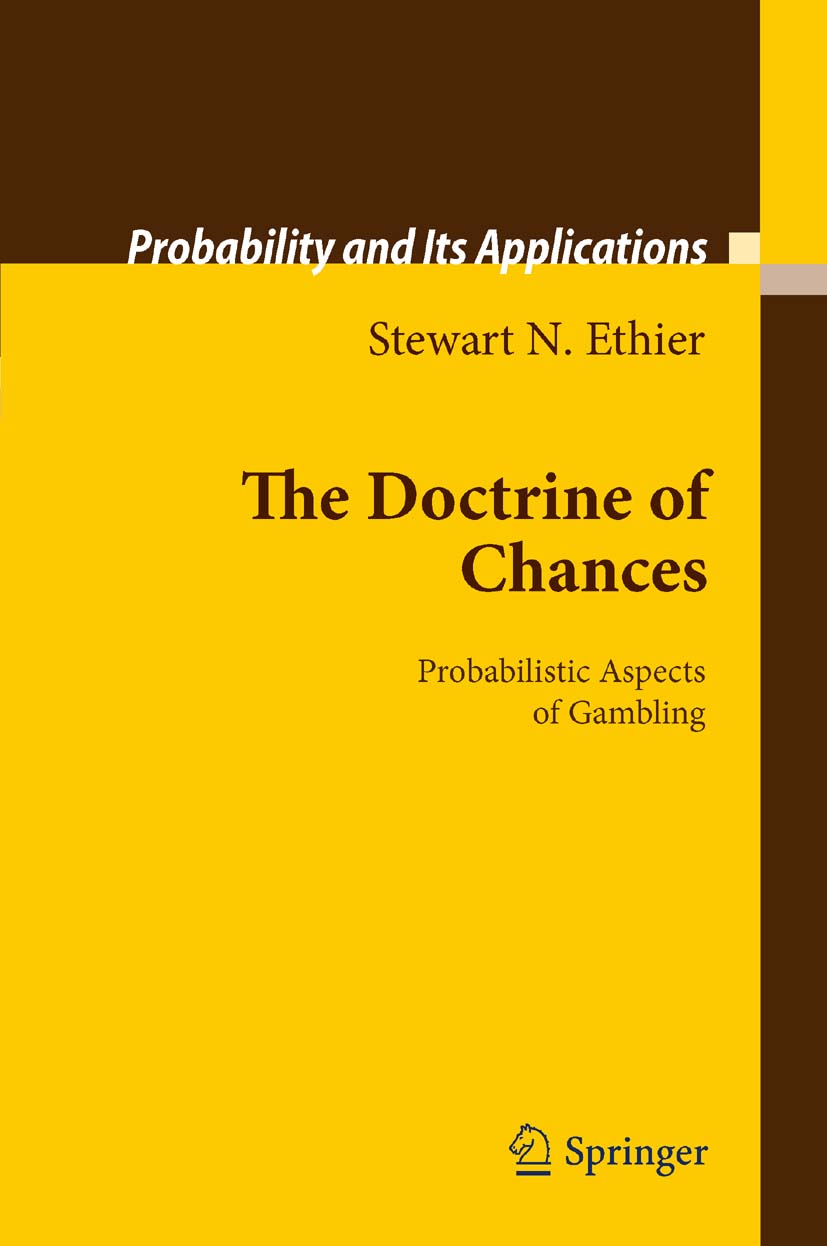The Doctrine of Chances: Probabilistic Aspects of Gambling

- The Doctrine of Chances: Probabilistic Aspects of Gambling by Stewart N. Ethier.
- Published by Springer, May 27, 2010.
- Published online at SpringerLink, May 19, 2010.
- Back-cover text: "Three centuries ago Montmort and De Moivre published two of the first books on probability theory, then called the doctrine of chances, emphasizing its most important application at that time, games of chance. This book, on the probabilistic aspects of gambling, is a modern version of those classics. While covering the classical material such as house advantage and gambler's ruin, it also takes up such 20th-century topics as martingales, Markov chains, game theory, bold play, and optimal proportional play. In addition there is extensive coverage of specific casino games such as roulette, craps, video poker, baccarat, and twenty-one."
- BibTeX entry.
- Download frontmatter (includes Preface, Contents, List of Notation). [pdf, xiv pages]
- Download sample chapter (Chapter 17, Video Poker). [pdf, 29 pages]
- Download backmatter (includes Appendix, Bibliography, Index). [pdf, 72 pages]
- Download Answers to Selected Problems (not included in the book). [pdf, 55 pages] (Updated Nov. 13, 2012)
- Download errata list. [pdf, 1 page] (Updated Feb. 24, 2013)
- Order at amazon.com (US), barnesandnoble.com (US), amazon.ca (Canada), amazon.co.uk (UK), amazon.fr (France), amazon.de (Germany), amazon.co.jp (Japan).
- View this page in Polish, courtesy of StudyBounty.
- View this page in Slovakian, courtesy of alex@e-ita.org.
- View this page in Bosnian, courtesy of WriteMyPaper4Me.
- View this page in Ukrainian, courtesy of StudyCrumb.
- View this page in Slovenian, courtesy of Katarina Hornik.
- View this page in Czech, courtesy of Sophi Spacilova.
- View this page in Spanish, courtesy of Science Team.
- View this page in Hungarian, courtesy of ProThesisWriter
- View this page in Indonesian, courtesy of ChameleonJohn.
- View this page in Portuguese, courtesy of homeyou.com.
- View this page in Hindi, courtesy of Nikol Barton.
- View this page in Latvian, courtesy of Pro-Academic-Writers.
- View this page in Swedish, courtesy of JustDoMyHomework.
- View this page in Estonian, courtesy of Admission-Writer.
- View this page in Uzbek, courtesy of WriteMyPaper4Me.
- View this page in Romanian, courtesy of globusbet.com.
- View this page in Georgian, courtesy of Ana Mirilashvili.
- View this page in Finnish, courtesy of Elsa Jansson.
- View this page in French, courtesy of SkyClinic.
- View this page in Turkish, courtesy of Patrick Kaufmann.
- View this page in Turkish, courtesy of Zoltan Solak.
- View this page in German, courtesy of Maximilian Neumann.
- View this page in Croatian, courtesy of ChicksX.
Peter Rabinovitch, MAA Online, 2010: "I'm very happy to be reviewing Ethier's labor of love The Doctrine of Chances: Probabilistic Aspects of Gambling. [...] There are many other books that attempt to cover similar material at varying levels of rigour, perhaps the closest being Richard Epstein's The Theory of Gambling and Statistical Logic. Ethier's book is clearly aimed at a more mathematically sophisticated audience than Epstein's, and for that reason I enjoyed Ethier's much more."
Gerald A. Heuer, Zentralblatt MATH, 2010: "Each chapter has a good selection of problems [...], and some interesting notes, including some very interesting history. There is plenty of material here for a solid two-semester course, but there is enough independence among the chapters to allow for a variety of one-semester courses covering a subset of the chapters. The book is a welcome and well-researched addition to the field."
Alexander V. Gnedin, MathSciNet, 2011: "Gambling was a major motivation in the early stages of unfolding the ideas and the theory of probability. Echoing the title of Abraham de Moivre's 1718 treatise [The doctrine of chances: or, a method of calculating the probability of events in play, Pearson, London], the monograph by Ethier is a welcome update of the classics. [...] The book is intended for a wide audience and is highly recommended for every mathematical library. University instructors will find thorough exposition, well suited for undergraduate courses and student projects. Experts in probability and adjacent fields will be excited by the gambling applications, with transparent explanations of game rules and terminology. Major pieces of the book can eventually be read by everyone familiar with the very basics of probability (covered in the first two chapters). Mathematical fans will be entertained by curious historical precedents and anecdotes."
Brian Alspach, SIAM Review, 2012: "This book has been written with great care by someone who loves the applications of probability to the casino industry. Even though it is rather long, the writing is fairly compact in the development of the mathematics, so it is thorough and contains a vast amount of material.
A great deal of care has been devoted to staying faithful to the history of the subject, which is rich and worth preserving. I enjoyed reading many of the sections filled with anecdotes about and quotes from well-known historical figures. The author adroitly weaves historical information throughout the book, enhancing the exposition; a paragraph involving Euler is followed by a paragraph quoting Edgar Allan Poe, for example, with no loss of flow. [...] In summary, as I wrote earlier, I find this to be a wonderful book and will spend considerable time exploring it in more detail over the coming months."
